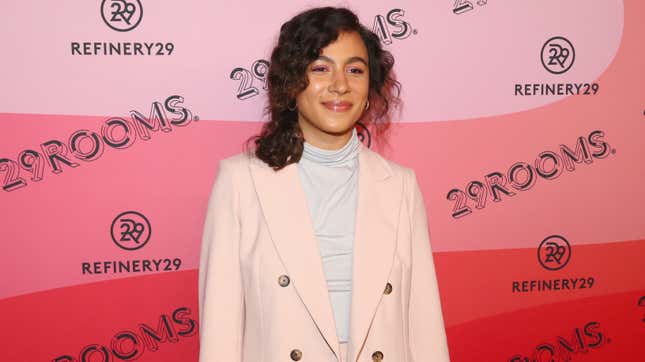
For those who know the name Aurora Perrineau, it’s typically in relation to the charges she filed against Girls writer and executive producer Murray Miller in late 2017, alleging he’d sexually assaulted her when she was 17, a minor. The allegations made national headlines when Lena Dunham and then-production partner Jenni Konner gave an unsolicited statement refuting Perrineau’s accusation, based on “insider information” Dunham later admitted never existed.
Or perhaps Perrineau’s name is familiar because her actor father, Harold, has been part of our cultural consciousness for decades, appearing in vehicles as diverse as Baz Luhrmann’s Romeo + Juliet, The Best Man franchise and Oz.
Now, Perrineau is reclaiming her name for herself, appearing in Ava DuVernay’s highly anticipated Central Park Five miniseries, When They See Us, on Netflix. Hand-picked by DuVernay, Perrineau plays the girlfriend of accused teen-turned-activist, producer and fashion designer Raymond Santana, opposite actor Freddy Miyares.
“I didn’t see many other people for that part,” DuVernay tells Glamour magazine in a recent profile on Perrineau, admitting she was familiar with the assault allegations at the time. “They had started to pull people for me, and I said, ‘Let me see her.’”
DuVernay tweeted in support of Perrineau as Dunham’s dishonesty was made public last December. As told to Glamour, after seeing the actress’s “fantastic” audition, DuVernay simply said, “I want you to be in this.”
For Perrineau, her role in recounting the story of the black and brown teens charged with (among other things) the rape and attempted murder of “Central Park Jogger” Trisha Meili hit home, though perhaps not for the reasons some would assume.
“My dad is a black man who grew up in that time,” Perrineau told Glamour. “It’s one of those stories that I’m hoping lights a fire under people who don’t know that this happens. A lot of people don’t know what this case is, but it’s like, ‘Oh, this was happening then. And it’s still going on.’”
And as Glamour notes, “[j]ust as the men in the case weren’t [believed], neither was Perrineau in her personal life.” Though many credited the #MeToo movement, propelled by allegations against Harvey Weinstein, with prompting Perrineau to come forward with her accusations against Miller, she’d actually filed a police report in Los Angeles months prior, after revealing the trauma to her parents after “a very dark time” that included “a lot of self-harm.” In fact, Perrineau had taken a lie detector test about the incident only a week before the Weinstein scandal broke.
“If I didn’t get it out, I don’t know what would have happened to me,” she told Glamour. “It was never a thing like, ‘I’m going to tell my story.’ I just wanted justice.”
Instead, Perrineau’s trauma made headlines and sparked controversy when Dunham and Konner opted to publicly weigh in, in defense of their friend, essentially calling Perrineau a liar who’d “misrepresented” the facts of the encounter. Miller’s team would also falsely claim that the accusations were part of an extortion attempt, which was later retracted.
“Woman to woman, I just thought that support would be there,” Perrineau admits, in reference to the inflammatory joint statement. “It’s hard enough to ever come forward, but then to be a woman of color and know that there’s a very good chance that no one is going to believe you? I think it opened my eyes to that.”
Dunham recanted the next day, but the damage was done. Nine months later, police declined to file charges against Miller, citing the statute of limitations and “inconsistencies and the delay in reporting.” Perrineau says she wasn’t discouraged, having freed herself from the burden of the assault.
“For a long time, I tried to figure out how to get my power back,” she told Glamour. “Going to the police station, filing a report—it kind of got the monkey off my back.”
Dunham ultimately apologized to Perrineau, privately and publicly, if in the opinion of some (like this writer), inadequately (Konner never made contact). With admirable grace, Perrineau accepted Dunham’s apology, but her name and reputation still threatened to be overshadowed by the stigma of being a victim, just as her career was getting off the ground.
“She apologized to me privately and explained why she felt like she did, and I think that was a big thing for her to do,” Perrineau said, also taking care to frame her assault—and those of others—in proper context.
“It’s been continuously about Jenni and Lena, and they weren’t the perpetrators,” she said. “There is still a bigger problem than them.”
In that context, When They See Us has multiple meanings, as Perrineau is now in a position to tell the stories of other survivors.
“I just have to keep doing my work and letting people know that I am working hard to get to where I want to be in my life,” she said.
“She has real depth, and I have high hopes for her,” said DuVernay.

